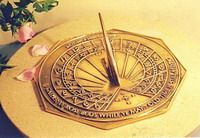Hugo Chavez to change time in Venezuela
Venezuela will be back in time - by 30 minutes.

Hugo Chavez's plan to turn back clocks by a half-hour has some Venezuelans pleased at the prospect of sleeping in. Others seem vexed that Chavez is making the entire nation change its daily rhythm. Some bloggers suggest Chavez wants to get out of Washington's "imperialist" time zone, but Venezuela will be a half-hour apart from his Cuban allies as well.
"It seems crazy to me," says 38-year-old Maritza Mendoza, who sells orange juice from a sidewalk stand in downtown Caracas. "It's a whim, just like the change of the currency."
Venezuela's upcoming launch of the "strong bolivar" - eliminating three zeros and reducing bills to 2-, 5-, 10-, 20-, 50-, and 100-bolivar denominations - joins a growing list of changes promoted by Chavez. He's transformed the national seal, the national flag and even the country's name - now the Bolivarian Republic of Venezuela, after independence hero Simon Bolivar.
Chavez has assured Venezuelans the time change isn't arbitrary - government officials have been studying it since 1999, seeking a compromise for a country wide enough for two time zones along South America's north coast. The change will be year-round - there's little need for daylight savings time along the equator, where daylight hours vary little by season.
The main benefit, Chavez says, is that most schoolchildren should no longer have to rise before dawn to make it to school.
"You're going to see the impact, especially children in school," Chavez said recently on national television. "Why? So that our bodies and above all our children take better advantage of sunlight and adapt the biological clock."
Chavez hasn't mentioned wanting to be in a different time zone from the U.S. government in Washington, though some have poked fun at that aspect of the change.
Chavez initially said clocks would roll back on Sept. 24, no matter what. "It doesn't matter to me that they call me crazy. The new time is going ahead," he said.
Changing time, as it turns out, isn't quite so easy - government officials later said it would take at least two or three weeks to revise one law, allow time for computer adjustments, update official time recordings and coordinate the switch with the France-based International Bureau of Weights and Measures, which oversees various international standards.
Now officials hope to make the change to 4½ hours behind Greenwich Mean Time in late October, according to Luis Marcano, a vice minister of science and technology. That will put Venezuela a half-hour behind Havana as well as Washington and the rest of the U.S. East Coast during daylight savings time, and Venezuela will be a half-hour ahead during standard time.
Venezuela won't be the only country insisting on such a half-hour difference from the rest of the planet. Others include India, Afghanistan, Myanmar, Iran and Sri Lanka, along with Canada's Newfoundland, parts of Australia and some islands in the Pacific and Indian Oceans.
Nepal truly goes it alone, at 15 minutes off the nearest hour.
Still, Chavez may have some explaining to do. Several passers-by in downtown Caracas confessed to not knowing whether the clocks would be turned back or forward. Chavez himself initially slipped up and described turning the clocks forward in one televised speech last month.
Motorcycle messenger Victor Nunez, 26, said he sees nothing wrong with giving Venezuelans a bit more time. "It seems good to me because I'm going to be able to sleep half an hour longer," he said.
And others said they too see benefits for schoolchildren. But since nightfall will come earlier as well, some said they'll have to be more cautious of crime on the way home from work.
And many others suggested the government has more important things to do with its time than fiddle with the clock.
"The clock is turned back a half-hour, life goes on just the same," said Eduardo Alabrin, 65, selling batteries on a street-side table. He said Venezuelans need more jobs and less crime - but not a new time zone.
Meanwhile, businesses this week began complying with the government's requirement to post prices in both the old and new currencies ahead of the Jan. 1 monetary changeover.
Chavez says eliminating three zeros from the bolivar - now fixed at 2,150 to the dollar - is a sound reform that will make life easier and strengthen the currency. Waxing nostalgic, he has said that Venezuela plans to bring back the "locha," a 12.5-cent coin that hasn't been used since the 1970s.
"Instead of going forward, we're going to go backward," says Mendoza, who voted for Chavez last year but is dubious about these changes. "We'll be going back to the time of the 'locha."'
Subscribe to Pravda.Ru Telegram channel, Facebook, RSS!


